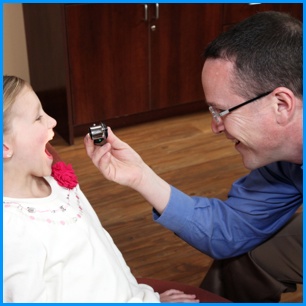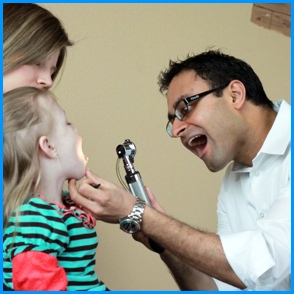A look at common swallowing conditions:
- Trouble Swallowing
- Drooling
- Foreign Body Aspiration
Trouble Swallowing

An infant or child who suffers from difficulty swallowing – also known as dysphagia- will have trouble passing food or liquids down the throat. The act of swallowing is a very complex, coordinated event that involves dozens of muscles and nerves working in coordination. Any number of different conditions can cause dysphagia. Your ENT for Children physician can help diagnose and treat these conditions. Children who experience dysphagia might exhibit it in one of the following types:
- Oral Dysphagia – The child will have difficulty chewing, sucking or maneuvering food or liquid into the throat.
- Pharyngeal Dysphagia –The child will have difficulty swallowing and moving food/liquid down to the esophagus.
- Esophageal Dysphagia –The child will experience reduced esophageal motility, or contraction.
An infant may also have trouble feeding because of dysphagia. This can lead to aspiration where liquids pass into the lungs. Another factor that influences how well infants feed is how well they are able to breath. Symptoms that are indicative of dysphagia may include:
- Stiffening or arching of the body during feeding
- Gagging or coughing while eating
- Recurring respiratory infections / pneumonias
- Hoarse voice
- Irritability during feeding
- Trouble swallowing during breast feeding
- Frequent vomiting and spitting
- Congestion during meals
- Difficulty chewing
Evaluation of dysphagia may include swallow x-rays, speech therapist evaluation or an office endoscopy using a fine flexible camera. Your ENT for Children surgeon might recommend a variety of treatments or surgical procedures for children who suffer from dysphagia.
Drooling
Drooling in infants and toddlers is very common. Children normally stop drooling after the age of 4. A child who has disorders that interfere with the muscles in the face or throat may drool excessively past that age.
Excessive drooling is not caused by excessive production of saliva but with a child’s inability to clear the saliva by swallowing. A child who suffers from a drooling condition might have trouble swallowing properly.
ENT for Children might recommend speech or behavioral therapy, surgery and other treatments for children who drool excessively beyond the age of 4.
Foreign Body Aspiration

Foreign body aspiration may occur when an object or piece of food gets lodged in a child’s respiratory tract. This can be an emergent, life-threatening event or can go undiagnosed for weeks or months. Each year over 100 children die from asphyxiation from foreign bodies in the airway in the United States. Most episodes of foreign body aspiration occur in children 5 or younger. This is because younger children have not developed their molar teeth yet to properly crush harder food, they often put foreign objects in their mouths and they tend to eat very fast without fully chewing. An aspiration event may cause a child to have a choking or coughing spell. A typical aspiration event includes a chocking/coughing spell followed by persistent wheezing, trouble breathing or infection. Children who have foreign objects stuck in their respiratory tract may exhibit the following symptoms:
- Vomiting or gagging
- Persistent wheezing
- Choking or coughing episode
- Trouble breathing
A thorough history and exam are critical to help diagnose an airway foreign body. Chest x-rays may be helpful but are not always conclusive. Your ENT for Children surgeon may recommend a bronchoscopy under anesthesia (looking into the windpipes of the lungs with special cameras), as this is the most definitive way to diagnose a foreign body. The bronchoscopy is also the best method for removal of the foreign object.
Proper education about how to feed children is the best way to prevent this potentially life-threatening problem. The American Academy of Otolaryngology has published tips and guidelines. These can be found at the following web addresses:
